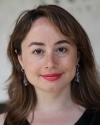 Many people with family histories of cancer are getting tested to identify their cancer risk and take action before it starts. For example, the actress Angelina Jolie, who inherited the BRCA1 gene and whose mother died of ovarian cancer, underwent two preventive surgeries to reduce her risk of breast and ovarian cancer, while patients with an increased risk of colon cancer often take a daily dose of aspirin to reduce their risk.
Many people with family histories of cancer are getting tested to identify their cancer risk and take action before it starts. For example, the actress Angelina Jolie, who inherited the BRCA1 gene and whose mother died of ovarian cancer, underwent two preventive surgeries to reduce her risk of breast and ovarian cancer, while patients with an increased risk of colon cancer often take a daily dose of aspirin to reduce their risk.
LUNGevity awardee Zeynep H. Gümüş, PhD, Assistant Professor of Genetic and Genomic Sciences at the Icahn School of Medicine at Mount Sinai and an expert in using computational technology to analyze the biology of cancer cells, wanted families with a history of lung cancer to be able to reduce their risk, too.
“I was inspired by the progress in other cancers,” says Dr. Gümüş, “and I wanted to help the families of lung cancer patients by developing tests that would tell them if they are at increased risk of lung cancer.”
Identifying patients who are at high risk for lung cancer would mean they could be screened more frequently and the cancer could be detected earlier. Finding lung cancer early, in stage I or II, significantly increases survival.
Researchers have already been looking for genetic variants that predispose someone to lung cancer. So far, they have been using computing power to search through common variants. They have found some variants that could possibly demonstrate a predisposition to lung cancer in approximately 2% of the lung cancer population.
“The previous work is not enough to use to develop a risk assessment test for lung cancer,” explains Dr. Gümüş. “We need to look for rare genetic variations. Each person normally has about 100 to 150 rare variants. We need to compare them and see if we can find one or more variants that predispose someone to getting lung cancer.”
At Mount Sinai, Dr. Gümüş has a lot of computational power at her fingertips. “Our high-performance computing clusters are world-class. We have the storage capacity and computational power to look for these rare genomic variants in hundreds of people in a reasonable amount of time.”
Dr. Gümüş first took advantage of this computational powerhouse to make major breakthroughs in identifying genetic variants that drive cancer progression. Then, in 2014, she was ready to do the same for variants that predispose individuals to non-small cell lung cancer, so she assembled a team of expert collaborators and applied for a research grant from LUNGevity Foundation.
The LUNGevity grant, along with the team’s expertise and the tremendous computing power at Mount Sinai, allowed Dr. Gümüş and her team to study the rare genetic variations in a population of Ashkenazi Jews. By focusing on the genetics of this group, which has less genetic diversity than the general population, the team was able to reduce background noise and find the rare variants they needed. Ultimately, Dr. Gümüş and her team identified a set of genes that indicates an increased risk of non-small cell lung cancer.
Dr. Gümüş expects that her collaborators will move forward with these findings to develop a unique biomarker signature test that tells patients if their family members are at increased risk of lung cancer. “Family members will simply give spit or blood to the lab for testing,” she says. “More work is needed, just to confirm that this test is worth people’s time. But based on our results, this panel of tests is very exciting.”
Encouraged by these results, Dr. Gümüş is applying for federal funding to continue her work. This time, she wants to look for genetic variations that predispose families to small cell lung cancer.
“This wouldn’t have been possible without the Early Detection Award from LUNGevity,” notes Dr. Gümüş. “Because of the award, I have learned so much about lung cancer detection and treatment. Plus, I am now part of an amazing network of lung cancer researchers that continues bringing hope and progress to lung cancer patients and their families.”
Juhi Kunde, MA, is a science writer for LUNGevity. 
